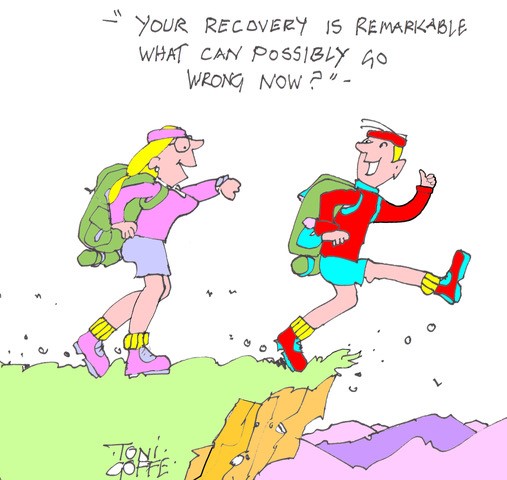Psychological ill-health Part 2
Exercise in the treatment of psychological ill health
There is a general belief that physical activity and exercise have positive effects on mood and anxiety, and a great number of publications describe an association between physical activity and general well-being, improved mood and lessened anxiety. Intervention studies describe exercise as lessening anxiety and depression in healthy subjects and patients. Recent well-controlled studies suggest that exercise training is clinically effective, at least in major depression and panic disorder.
The Cochrane Review of the effect of exercise in the treatment of depression, involving some 1,356 participants, showed exercise to have a moderate clinical effect. The same report found that exercise also appeared to be as effective as either psychological therapies or anti-depressant drug treatment. When targeted specifically at depressed adolescents, exercise also has a moderate effect. Even light levels of exercise help, but the response to exercise is related to the degree of increase in cardiorespiratory fitness achieved – so harder is better!.
Exercise may also work for resistant depression which has failed to respond to other treatments.
Clinical application
Although the evidence for positive effects of exercise and exercise training on depression and anxiety is growing, the clinical use, at least as an adjunct to established treatments like psychotherapy or medication, is still at a very early stage. Exercise on its own, though clearly useful as an antidepressant, may not work so well as CBT (Cognitive Behavioural Therapy). The ideal is to use both together.
Speed of onset
Exercise has an immediate effect on mood. One study of anxious women examined the effect of exercise at different intensities. Those who exercised at a high intensity for 30 minutes on an exercise cycle felt considerably better after their workout. The benefits lasted for up to 90 minutes afterwards, compared with just 30 minutes after a moderate workload.
The Psychiatric view
The Royal College of Psychiatrists recommends regular exercise as part of the treatment of anxiety and depression and explains some possible reasons why it is beneficial:
“Most people in the world have always had to keep active to get food, water and shelter. This involves a moderate level of activity and seems to make us feel good. We may be built – or ‘hard wired’ – to enjoy a certain amount of exercise. Harder exercise (perhaps needed to fight or flight from danger) seems to be linked to feelings of stress, perhaps because it is needed for escaping from danger.
- Exercise seems to have an effect on certain chemicals in the brain, like dopamine and serotonin. Brain cells use these chemicals to communicate with each other, so they affect your mood and thinking.
- Exercise can stimulate other chemicals in the brain called ‘brain derived neurotrophic factors’. These help new brain cells to grow and develop. Moderate exercise seems to work better than vigorous exercise.
- Exercise seems to reduce harmful changes in the brain caused by stress.”
Mental health
Just as physical health is much more than the absence of physical illness, so it is for mental health. There is a large number of instruments for assessing mental well-being from a number of different perspectives. These include emotional well-being, life satisfaction, optimism and hope, self-esteem, resilience and coping, spirituality, social functioning and emotional intelligence. Most of these areas seem to benefit from regular physical activity.
The Covid pandemic has highlighted the importance of mental health to the well-being of the population, with an emphasis on young people. The prevalence of poor mental health is higher in girls than boys and the level of physical activity seems to be the deciding factor. Exercising for between 2.5 and 7.5 hours per week has been shown to be protective. In adults, there is also a relationship between physical activity and self-reported days of poor mental health, showing the more exercise taken, the less psychological ill health. Active commuting, such as walking or cycling to work, helps, while too much sedentary time makes things worse.
 You can order a copy of my latest book here! This is directly through me for £12.50 and includes P&P.
You can order a copy of my latest book here! This is directly through me for £12.50 and includes P&P.
Alternatively, you can get in from Amazon for £14.76. The ebook version costs £4.49 but is free to KindleUnlimited members!
From Alton Waterstones for £14.99
From Alton Cardiac Rehab for £12.00 which includes a donation to the Charity 💕
Subscribe to the blog
Categories
- Accelerometer
- Alzheimer's disease
- Blood pressure
- BMI
- Cancer
- Complications
- Coronary disease
- Cycling
- Dementia
- Diabetes
- Events
- Evidence
- Exercise promotion
- Frailty
- Healthspan
- Hearty News
- Hypertension
- Ill effects
- Infections
- Lifespan
- Lipids
- Lung disease
- Mental health
- Mental health
- Muscles
- Obesity
- Osteoporosis
- Oxygen uptake
- Parkinson's Disease
- Physical activity
- Physical fitness
- Running
- Sedentary behaviour
- Strength training
- Stroke
- Uncategorized
- Walking


